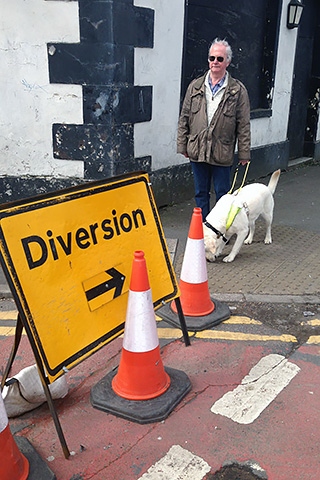Report sets out challenges faced by blind and partially sighted people
Date published: 08 April 2015

Castleton resident Frank Salt and his guide dog Lewis
highlight one of the challenges faced by blind
and partially sighted people
A report that delves into the challenges faced by blind and partially sighted people when out and about has been published by The Royal National Institute of Blind (RNIB).
The report sets out evidence which demonstrates how unsafe local neighbourhoods and the street environment can be for those with sight loss and discusses how these problems could be addressed by local councils and decision makers.
To help shape the report, the RNIB team carried out a survey of blind and partially sighted people, alongside investigating some of the polices and procedures that local authorities currently have in place to shape the built environment.
Those involved with the survey told the RNIB that on a day-to-day basis, they face the following problems when out and about:
- Street obstacles – both permanent and temporary.
- Dangerous roads which do not have adequate, safe or accessible pedestrian crossings.
- Developments that remove kerbs and crossing points, making an area more difficult for blind and partially sighted people to walk around.
Challenges are also faced in the way that local authorities communicate information affecting the street environment to blind and partially sighted residents, including:
- Local authorities making decisions which impact on the street environment without understanding the mobility needs of someone living with sight loss.
- Communication from local authorities being issued on inaccessible formats.
- Consultations that are promoted and issued using inaccessible formats, alongside local authorities failing to involve and engage people with sight loss.
- A postcode lottery approach to policy and decision making by those who have an impact on the design and enforcement of the street environment.
Councillor Billy Sheerin, who has been involved with the report with Rochdale Council, said: “I have been doing some work with the council in terms of the charter that the RNIB has produced and we are trying to work so that people who are blind or partially sighted and are walking along a stretch of road don’t face obstacles that may or may not have been there the previous day. It is all about keeping people safe and safeguarding people.”
The RNIB is now calling for three key changes:
- The government to review the 2005 guidance called ‘Inclusive mobility: a guide to best practice on access to pedestrian and transport infrastructure.’ The RNIB want provisions to be strengthened around highway obstructions and reinforcing existing legislation around the use of tactile paving, kerbs and crossings.
- Local authorities to engage with local blind and partially sighted people to develop a street charter that puts a clear highway policy at the heart of their local decision making.
- Local authorities to review their policies in relation to the six most common obstacles (parking on pavements, a-boards, inaccessible crossings, bins and recycling boxes on pavements, street furniture and developments that include shared space) facing blind and partially sighted people.
Do you have a story for us?
Let us know by emailing news@rochdaleonline.co.uk
All contact will be treated in confidence.
Most Viewed News Stories
- 1Castleton station ‘to become epicentre of huge change and growth’
- 2'Eyesore’ land in the town centre will become home to new apartment block
- 3Roadworks, temporary road closures and restrictions
- 4How life has changed on a notorious, crime-ridden estate shut off to outsiders
- 5Young refugee honoured with prestigious cricket award
To contact the Rochdale Online news desk, email news@rochdaleonline.co.uk or visit our news submission page.
To get the latest news on your desktop or mobile, follow Rochdale Online on Twitter and Facebook.

